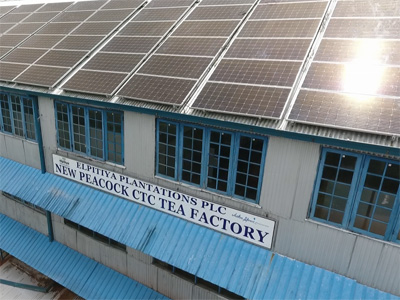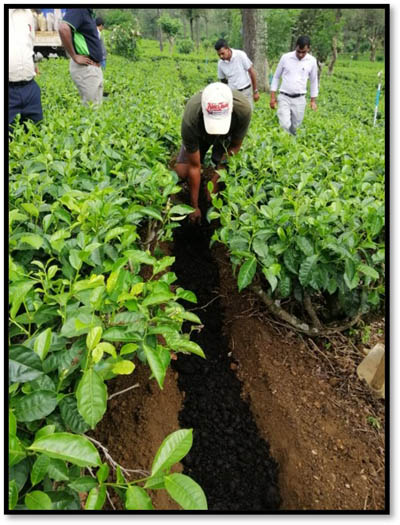Elpitiya Plantations blends legacy and innovation in unique sustainability roadmap
 Many of Sri Lanka’s Regional Plantation Companies (RPCs) are redefining themselves through innovation, breaking away from the legacy practices of the sector. In this week’s, ‘RPC Innovation Series,’ we explore pioneering initiatives undertaken at Elpitiya Plantations PLC, and how such innovations have the potential to transform Sri Lanka’s RPCs. Many of Sri Lanka’s Regional Plantation Companies (RPCs) are redefining themselves through innovation, breaking away from the legacy practices of the sector. In this week’s, ‘RPC Innovation Series,’ we explore pioneering initiatives undertaken at Elpitiya Plantations PLC, and how such innovations have the potential to transform Sri Lanka’s RPCs.
Legacy and innovation would typically be seen as opposites. However, Elpitiya Plantations PLC sees these as complementary. The company has carved out its own unique brand of sustainability, by blending ancient philosophy with cutting-edge technology, bringing about transformational change in all areas of its operations.
“Sri Lanka’s history and heritage offer us many invaluable lessons on sustainability, which are perhaps more relevant than ever today, as we start to witness the effects of climate change,” Elpitiya Plantations CEO, Bhathiya Bulumulla says, explaining the company’s sustainability ethos. “For instance, we Sri Lankans recall King Parakramabahu’s famous words, whenever water conservation is mentioned. Not a single drop should be released to the ocean without use.”
 “Being part of the plantation sector, which too has a long legacy, we value the wisdom passed down through the ages. However, we should not ignore the technology that is now available which is capable of transformational change, particularly in spheres like agri-tech and precision agriculture. Sustainability, as we see it, stems from innovation which combines the best of two aspects; legacy and technology.” “Being part of the plantation sector, which too has a long legacy, we value the wisdom passed down through the ages. However, we should not ignore the technology that is now available which is capable of transformational change, particularly in spheres like agri-tech and precision agriculture. Sustainability, as we see it, stems from innovation which combines the best of two aspects; legacy and technology.”
This approach has certainly delivered dividends for the company, which is on track to achieve its best-ever annual financial performance, despite challenges – including the lack of sufficient fertiliser due to the ban imposed earlier by the authorities. The company has also made significant progress in its Environmental, Social and Governance (ESG) commitments, which are linked to six Sustainable Development Goals (UNSDGs). Through greater digitization, which has been extended to even field-level activities, Elpitiya Plantations is also able to better monitor outcomes of initiatives.
Perhaps most impressive are the company’s achievements under SDG 15, which relates to the protection and conservation of ‘life on land’. Elpitiya Plantations has adopted many practices to use its land more efficiently and sustainably, by efficient water usage and the need for minimizing the application of synthetic fertiliser and agro chemicals.
 Technologically-advanced measures such as fertigation; important to soil fertility retention in which fertilizer is applied through irrigation, in a manner that minimises wastage - and other precision agriculture technologies have been deployed by the company. Supplementing these, Elpitiya Plantations is also increasing the use of mechanisation in its operations – for instance in the plucking of tea, in alignment with UNSDG9 – Industry innovation and infrastructure. Technologically-advanced measures such as fertigation; important to soil fertility retention in which fertilizer is applied through irrigation, in a manner that minimises wastage - and other precision agriculture technologies have been deployed by the company. Supplementing these, Elpitiya Plantations is also increasing the use of mechanisation in its operations – for instance in the plucking of tea, in alignment with UNSDG9 – Industry innovation and infrastructure.
Following assessments using latest methods such as geographic information system (GIS) mapping, the company has diversified into a range of new crops to make optimum use of its land. (UNSDG-9) These include berries of different types, coffee, hass avocado, pineapple, bamboo, and agarwood. Some of these crops, such as berries, are being cultivated in climate-controlled greenhouses. The company is also working with smallholder farmers on organic cinnamon cultivation.
These high-value crops with strong domestic and international demand differ significantly from the crops that are typically cultivated by most Sri Lankan plantations – such tea, rubber and oil palm. Elpitiya Plantations continues to cultivate these traditional crops but has implemented concerted measures to increase their yields, quality and align them better to cater to niche markets such as organic produce.
For instance, by applying inputs developed internally by the company such as biochar and compost, carbon levels have been increased in tea fields, enhancing the water and nutrition retention capability of the soil. Elpitiya Plantations is striving to increase soil carbon levels up to 3%. A 1% increase in carbon levels is estimated to increase the level of water retention by 25,000 litres in a one-acre land extent. Elpitiya Plantations has also minimised the use of agro chemicals (UNSDG-15 – Life on land) through integrated agriculture practices, for instance by only applying chemicals to combat identified ‘unfriendly’ weeds.
 Complementing these developments, the company has also embarked on a major rainwater harvesting project, to mitigate the impact of increasingly unpredictable weather patterns, by developing 77 ponds harvesting over 254 million litres within its estates. This, together with water conservation measures, ensures sufficient water availability, even during drought periods. (UNSDG-06 – Clean water and sanitation) Complementing these developments, the company has also embarked on a major rainwater harvesting project, to mitigate the impact of increasingly unpredictable weather patterns, by developing 77 ponds harvesting over 254 million litres within its estates. This, together with water conservation measures, ensures sufficient water availability, even during drought periods. (UNSDG-06 – Clean water and sanitation)
“We no longer waste the waste generated from our operations, it all goes into producing organic compost,” quips Elpitiya Plantations Senior General Manager Sustainability - Ishafir Izzadeen explaining the company’s focus on circularity. “We continuously experiment and challenge ourselves with new ways of doing things. Sustainability is now very much ingrained in our core business, and we continue to improve our business performance as we progress in our sustainability journey.”
Elpitiya Plantations has also seen significant improvements in its energy conservation and sustainable energy generation efforts. By the end of December 2021, the company was generating more than 150% of its energy requirement through renewable sources, adding ‘clean energy’ to the national grid. Elpitiya Plantations’ solar energy generation initiative has been a key contributor under UNSDG-07 – affordable and clean energy.
Now, the company is partnering a foreign company to divest further into electricity generation through a mega wind power project. Elpitiya Plantations and its partner have submitted tenders for 12 wind farms, each with an annual power generation capacity of more than 50MW and is awaiting approval from the authorities.
The company is also collaborating with local universities and foreign organisations on carbon credit projects, in addition to efforts to be self-sufficient in its thermal power generation – through its bamboo cultivations. Elpitiya Plantations has committed a total of Rs. 195 million investments from 2020 onwards, in order to upgrade to fuel-efficient and thermal boilers.
Recognising the importance of capacity development for sustainable progress, the company has incorporated raising awareness on sustainability to its community development projects. Elpitiya Plantations also conducts annual medical camps and health screening to provide medical advice to improve the physical and mental health of its 5,800 employees. In addition, education support including provision of free textbooks, educational material, and scholarships for higher studies, are provided for schoolchildren residing in estates managed by the company under UNSDG-08 – Decent work and economic growth.
Since taking over its estates following the privatization of the commercial plantation sector in 1992, the company has in total upgraded new housing of 1,986 units for employee families by providing them with individual houses. Elpitiya Plantations is also working with organisations such as Save the Children, for the wellbeing of mothers and children residing in its estates.
These efforts have won Elpitiya Plantations a plethora of independent endorsements – including both awards and certifications. The company has received Rainforest Alliance, ISO 22000 and Forest Stewardship certification, Organic cinnamon accreditation, and has also received Best Corporate Citizen Sustainability Awards from the Ceylon Chamber of Commerce. CMA Best integrated report in plantation sector and Best Annual report silver award by CA. Elpitiya Plantations will also soon initiate the process to obtain carbon neutral accreditation from the Sri Lanka Climate Fund.
Looking to the future, the company has several key initiatives in the pipeline. Elpitiya Plantations will become part of the Science Based Targets initiative (SBTi) of the UN Global Compact in 2022, which seeks to reduce greenhouse gas emissions. The theme park for which the company is collaborating with Sim Leisure Group Ltd., a listed company in Singapore Stock Exchange, is expected to open in 2023. This is part of Elpitiya Plantations’ efforts to enhance business sustainability through diversification under UNSDG-17 – Partnerships for the goals.
The company also commenced operations at its purpose built tissue culture lab recently, which has potentially national implications, including the production of planting material for rare endemic herbal plants.
Innovative products such as, Strawberries, Blackberries, Raspberries, Cinnamon, speciality coffee Natural, Bee’s honey, Kithul treacle, Strawberry, and soursop jams, Tropifrut smoothies that are offered by the company are available for sale at Elpitiya Plantations’ first retail outlet – ‘Harrow House’ located in Vauxhall Street, Colombo 2.
Released in March 2022
|